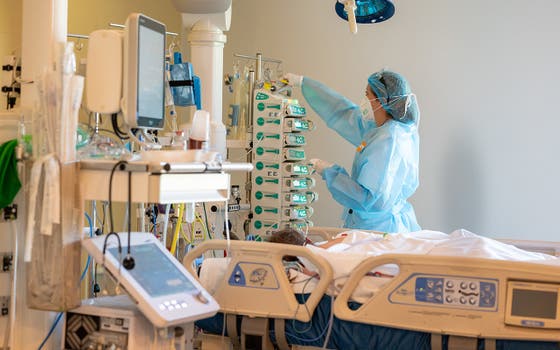Antiplatelet therapy not effective in treating critically ill COVID-19 patients

For patients with COVID-19 who are receiving organ support in an ICU, antiplatelet therapy, either with aspirin or P2Y12 inhibitor (which were found to be equivalent), was ineffective at improving the composite endpoint of death and organ support free days when compared to no antiplatelet therapy.
These findings, based on an analysis of 1467 critically ill patients, which are yet to be published, come from the REMAP-CAP trial, led in Europe by the University Medical Center in Utrecht, the Netherlands. At a planned adaptive analysis, the probability of futility of antiplatelet therapy (defined as an odds ratio of < 1.2) was 98%, well above the platform threshold of 95%. Previously, aspirin and P2Y12 inhibition had been proven to be equivalent in the trial. The odds ratio for improving the primary outcome of death and organ support free days was 0.99 (95% Credible Interval 0.82 – 1.19) for these drugs, compared to control.
REMAP-CAP began investigating treatments for COVID-19 in March 2020, enrolling hospitalized non-critically ill and critically ill patients. The study design randomizes patients to multiple combinations of treatments, enabling researchers to evaluate different treatments for COVID-19, including drugs which modulate the immune response, drugs affecting the coagulation system, and therapies that modulate or support other vital aspects of the body's response to the virus.
Since the start of the pandemic, over 12.500 randomizations of patients with COVID-19 have occurred in the trial, at over 320 hospitals worldwide. REMAP-CAP investigates 48 current or completed interventions in 14 different treatment domains. The study has released and published several platform conclusions that have contributed to finding the best treatment for these patients.
We look forward to receiving more detailed analysis that includes thrombotic and bleeding outcomes to properly understand the context of these results. These valuable research findings add significantly to the accumulating evidence of antithrombotic use in patients with COVID-19 and represent the hard work of many individuals. We would like to sincerely thank the investigators, research coordinators, participants and their families, who continue to support REMAP-CAP for their contribution.
This project has received funding from the European 7th Framework Programme under grant agreement No [602525].
This project has received funding from the European Union’s Horizon 2020 research and innovation programme under grant agreement No [101003589].
